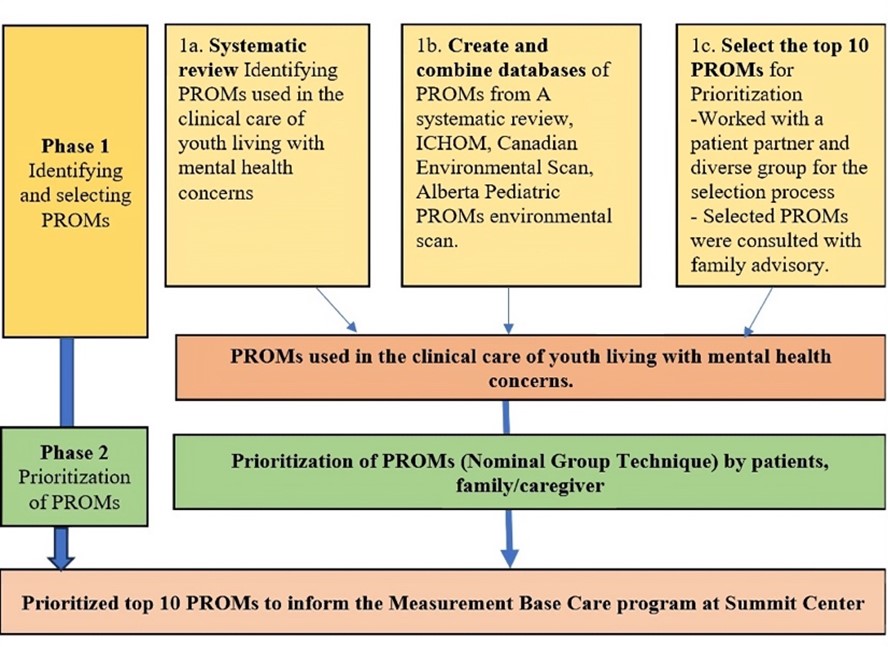Maria Santana, PhD, Departments of Paediatrics and Community Health Science, Cumming School of Medicine, University of Calgary
Kalpana Thapa Bajgain, MSc MPHM, Department of Community Health Science, Cumming School of Medicine, University of Calgary
It is of utmost importance that patients’ and caregivers’ priorities are considered while selecting and implementing patient-reported outcome measures (PROMs) in mental health settings. The study “Prioritizing Patient Reported Outcome Measures (PROMs) to use in the clinical care of youth living with mental health concerns: a nominal group technique study” published in the Journal of Patient-Reported Outcomes provides practical recommendations around measures best suited to achieve this.
Background
In Calgary, Canada, on March 13th, 2023, The Summit: Marian & Jim Sinneave Centre for Youth Resilience opened its doors as Calgary’s first community-based mental health centre for young people. In preparation for this novel community centre, a group of researchers came together the previous year to work on the research program that would bring evidence to support clinical practice. Dr. Santana and colleagues proposed the implementation of PROMs to inform the measurement-based care program.
Measurement-based care (MBC) implements patient outcome measurement to guide treatment decisions. PROMs play a vital role in MBC.
About the Study
While working with the stakeholder team, it was evident that the engagement of youth and caregivers was scarce. How could we implement PROMs in their clinical care without their input? The inclusion of patients and caregivers in our research program as partners was not optional. We partnered with a group of youth and caregivers with lived experience of mental illness to ensure the selected PROMs were feasible, relevant, and acceptable to them.
Our paper describes the selection and prioritization of PROMs by youth and caregivers to inform and support the development of the MBC program for youth living with anxiety and depression. Figure 1 below describes the study depicted in the paper.

Figure 1: Study at a glance
Our main findings are related to the identification and prioritization of PROMS. In phase 1 of this study, we identified evidence-based PROMs and informed by youth and caregivers. Amongst them were the Revised Child Anxiety and Depression Scale (RCAD 25), the Screen for Child Anxiety-Related Disorder (SCARED), the Beck Depression Inventory (BDI) and The Young Person’s Core (YP-CORE). In phase 2, PROMs were prioritized for their relevance (domain coverage), feasibility (number of items, time completion and method of administration), and overall importance. The median and Interquartile range (IQR) were calculated for each PROM. Based on the median score and IQR, the PROMs were ranked from top priority (highest median) to lowest priority (lowest median). RCADS 25 was prioritized as the top PROM by youth and caregivers, with the highest median score (9.5), as it was felt to be comprehensive, short, easy, and quick to complete.
As a community of international experts in PROM development and implementation in clinical care, ISOQOL members’ expertise and work have supported our study. For instance, the evaluation of the PROMs’ measurement properties was informed by previous work conducted by ISOQOL measurement experts. Additionally, the ISOQOL community has produced extensive evidence on implementing PROMs in routine clinical care that has been used in this MBC program. This includes learnings and recommendations on implementing PROMs in the routine clinical assessment and management of patients and highlighting how these PROMs provide valuable information. This information can be used to address treatment efficacy, help evaluate disease progression and regression, and help identify patients who may be at risk, allowing healthcare professionals to evaluate the quality of their care continuously.
This study adds to the evidence on the selection and implementation of PROMs in clinical care, specifically to the importance of involving youth living with anxiety and depression in the selection of PROMs for use in their routine clinical care. Furthermore, this project has informed the MBC program for youth living with anxiety and depression in a newly developed community mental health centre. The MBC program is currently in place, and future research communications will shed light on the success of the program.
This newsletter editorial represents the views of the author and does not necessarily reflect the views of ISOQOL.
How to Submit a Newsletter Editorial
Do you have something to share about health related quality of life and patient-centered outcomes? We want to hear from you!
Learn More

The International Society for Quality of Life Research (ISOQOL) is a global community of researchers, clinicians, health care professionals, industry professionals, consultants, and patient research partners advancing health related quality of life research (HRQL).
Together, we are creating a future in which patient perspective is integral to health research, care and policy.
